PARA LARA: a song to a Muse
PARA LARA: a song to a Muse,… on light years of travel.
by Norman Warwick
My song-writing partner of forty five years of standing, is seen on camera walking through a park and sitting down on a bench to take his guitar out of its case.

So far, its all very Wayne Fontana and UM UM UMUM UM. Although the camera is focussed on Colin we have the sense there is a crowd around him and as he begins to speak it is to this unseen audience rather than to camera. He tells them he is about to play them a new song that is a work still in progress. (I can tell you this new song, (to which I wrote the lyrics) is already almost five years old) and when Colin says it is ´still a work in progress´ he means it has light of years of travel still to go before it becomes fully formed. A song is just like any other work of art and, like a painting or a sculpture, a song is rarely finished. The musician constantly changes the chords, the producer potters about on the bridge, the technician tampers with the tapes and the lyricist constantly changes his mind about which line he likes most. Songwriters are as twitchy as artists, who will paint over this and change the colour of that or like sculptors who make this bit smoother and rounder and that bit jagged and more pointed.
Even the introductions of songs change character (of the writers) and characters of the song. If I needed reminding of this Colin gives me a nudge on camera as he tells his audience the history of the song.
´The lyrics were written by my partner Norm´. he tells them, ´It is a love song, I think, between a young girl, and a man who is, let´s say, several generations older !´
Thanks for that Col. You´ve just ensured I won´t be playing this video for my wife, and I´m not sure now I can´t even send it to the young girl who is the subject.
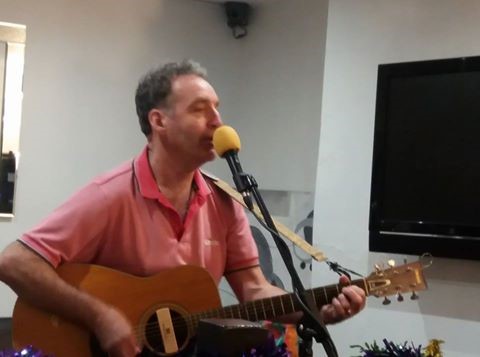
Colin goes on to explain that the song has a slight Spanish influence and rhythm and tells the audience of the difficulty we have had in finding a syllable structure that would enable us to include the Spanish chorus Col had come up with.
Then Colin is off and playing the song over the audio background of children chatting. I listen closely to the words to see if any of the necessary changes he has made have given the song any kind of new but unwanted nuance. Actually, he has achieved something very Gilbert O´Sullivan-esque in referencing the song to his young grand daughter, so making it a familial story rather than a love song.
With an old friend, singer-writer Ged Morgan, on board to help with that Spanish bridge the song is quite likely now to cross the river into the studio, but the song has already travelled several times between Colin and via e mail from Lanzarote to Jersey and back again. Collaborating was difficult enough even when we used to share song- writing nights once or twice a week in England at my house. We must have done something right though, as we recorded all our material and even had others recording our material too. You can check all this out on
www.lanzarotelendanearmusic.com
Of course once you have recorded an acceptable take of a song or have integrated it into your live performances, all thoughts of the hard work, arguments and difficulties in doing so become distant memories. What helped us overcome all that and produce outcome was our trust in each other. There was no musician I would have ever preferred to put music to my words.
All our songs are important to us as collaborators and we also each have our personal reasons for loving a song.
The song Colin sings on this fb post is called Para Lara and it was the first, (and is still one of only three) I have created since retiring here to Lanzarote.
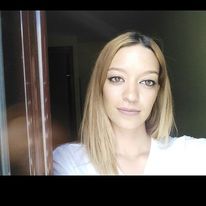
Any writer is entitled to keep his muse private, if he or she wishes, but I can tell you that Lara Hernández Martin is 24 years old and comes from Arrecife but now lives in the South Of The Island. We bumped into each other in a shopping queue one day a few years ago. We had great difficulty in maintaining even the brief etiquette of a conversation but somehow fell into a comfortable friendship despite me constantly correcting her English, which was way, way better than my Spanish and we kind of fell into an InterCambio relationship whenever we met. Her English has come on in leaps and bounds whilst my unsteady Spanish has staggered backwards into Spanglish. We know quite a bit about each other now, and I´m aware that she is typical of her generation of bright, well-educated and ambitious Lanzarote people. She has a great friend and support in her mum, who is also a friend of mine, and I know that Lara is studying English Creative Writing with a view to becoming an interior designer and would also like to become a wife and mother. My wife reminds me that will be with some handsome and eligible young Spaniard not with a decrepit old English man and although I´m sure Lara´s agreement with that statement lost something in translation it nevertheless sounded pretty deflating to a sixty eight year old who still thinks he could play football for England.
It was quite early in our friendship that I told Lara that I am a writer and poet and she mischievously asked me to write a poem for her. I think she had forgotten all about the request when I presented her with the finished version about a month later. I received much applauso from her mum Griola, and her friends Angie and Paloma and thankfully from Lara herself and she tells me she now has it framed in her house.
Despite the fact that thirty odd years ago my wife, Dee, prohibited me with threats of ripping my head off, or something, from reading in public a poem I had written celebrating Old Flames she seems far more sanguine now I am no longer considered a threat to society.
And so the long journey of the song began. The more I read it, the more lines I liked and so I sent it to Colin while he was in the studio re-recording some of old stuff. After several exchanges and revisions we are nearly there and we will discuss soon whether it is a viable proposition to record.
My wife, fortunately is sensible enough not to listen to any of my works as if they are love songs. She knows that, instead, they are songs to my Muse, whatever I may call her.
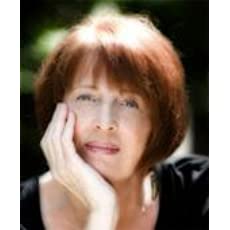
Robin Frederick (right) is a professional songwriter, music producer and recording artist. She is a former Director of A&R for Rhino Records , Executive Producer of 60 albums, and the author of seven best-selling books on song-writing, including Shortcuts To Hit Song-writing and Shortcuts To Song-writing for Film & TV.
As she explains in a post on-line, ¨The poet, songwriter, or artist has a unique relationship with the Muse. Painters are inspired by their models, poets dedicate their finest work to their Muse, and troubadours express their yearning for the Beloved in song´.
Robin has been writing under the influence of muses for many years and thinking about the way they enter and change our lives. During this time, she noticed that many people, even people who would never refer to themselves as artists, have met and been inspired by a muse.
So it seems the muse can come into the life of anyone who is attuned to their presence, anyone who is as Robin puts it, ´aware, compassionate, empathetic, and in pursuit of understanding and knowledge´. Robin call this the ´poet’s soul´.
She has got that right, and pretty much what she sees as defining a poet´s soul is the conclusion I long ago came to about my own attitude to life. Regardless of any success, lack of, or even downright failure to create any great work I am aware that I look for the truth behind reality and rarely accept easy explanations as answers or responses. I walk the path less travelled and usually alone. I seem to notice things that others do not, perhaps because what I notice isn´t ´really´ there. I look for meanings of dreams and I know that words can both reveal and conceal real meaning. My new loves are always deep (though my old loves are deeper) and I have to find new ways to express them.
I know that a great deal of what I do as writer id don,e too, by those who dance, paint or sculpt, or like Colin, create music. My writing, as is hers, says Robin, is driven by love and the intense feelings it brings.
Robin reckons that ´most people think of the Muse as an elegant figure in flowing robes frozen in time on some ancient Grecian urn. Robert Graves, the British poet and novelist, equates the muse with the White Goddess or Triple Goddess of the ancient Celts: she who wields the power of life and death, inspiring awe and fear, love and lust in everyone with eyes to see her.
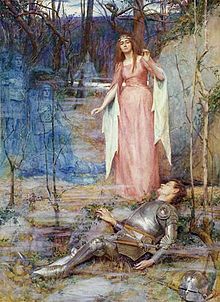
´It is understood that Pre-Raphaelite painters sought out this idealized representation of the muse in real women and painted them again and again. Keats described a fatal encounter with her in his poem “La Belle Dame Sans Merci.” The legend of King Arthur celebrates her multiple faces in the figures of Guinevere and Morgan Le Fey´. (see right)
The muse is universal; she is anonymously referenced r in the poetry and songs of all languages. According to Robin, she is found in India, where her hair is black, in Africa where her skin is dark.
In my work the physical impression is blurred. Although she is a stunning looking young lady, I was not attracted to Lara by her beauty. I was instead ´amused´ by her sense of humour, her willingness to laugh, and by how she never allowed her inate steel, and determination to succeed and make something of herself out of this harsh landscape, to disguise her femininity.
I am aware that with Lara I invest far more in what is a friendship very distanced by gender, age and culture but I still remember the sense of recognition there seemed to be in our first brief encounter. I don´t view other friends in the same luminosity. I find myself in full agreement with most of Robin Frederick´s observations, but I do wonder about this aspect of The Muse. The poet in me accepts the presence of a Muse unquestioningly but I know how suspicious some people will be that my comments are a ruse, not a muse. I have no belief that the importance a poet attaches to his Muse is in any reciprocated by the Muse. Indeed it may be this very lack of reciprocity that makes the Muse so appealing.
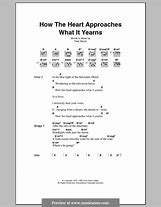
I know how pretentious this might / will sound, but the joy of writing these posts that nobody reads is that it sets my mind to wandering. The paragraph above sent me thinking of Paul Simon´s lyric (right) of How The Heart Approaches What It Yearns. After knowing the song and loving it for years I am led to thinking in writing this article that is actually a song in search of The Muse: the far-away and unattainable.
I am not seeking to turn the notion of a Muse into something trivial and mundane, for the intangible dreamlike image I hold in mind and heart is anything but trivial. It is, in this very moment, necessary to my work.
I think most artists of all kinds recognize the Muse for what she is: a way in, a doorway into the deep underground of the psyche. It may happen more than once.
Robin tells us that Picasso had several muses, so it would seem I am in good company.
For many artists, meeting a Muse is a unique and singularly memorable experience, one that can transform a life.
I certainly can´t explain how or why this happens but Robin sounds fairly certain it is something to do with what Jung called the anima in a man and animus in a woman. That doesn´t really clarify anything for me, however. Nevertheless she goes on to say that a poet sees in his Muse a reflection of what she calls ´his own poet soul´. She says that artist and Muse can only converse through the language of art, and I would therefore point you to my InterCambio reference of earlier.
We call the Muse the Other, when it is in fact simply a reflection of our Self, so The Muse can never be approached, never touched. The image of The Muse is further away the nearer to it you go. Lara and I have only ever met by serendipity and I know it would be self destructive of me to seek to manage or contrive such meetings.
Of course, what makes a Muse so desirable is her very unattainability.
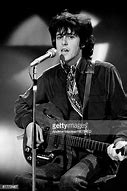
There is a beautiful example in a traditional folk song, Black Is The Colour Of My True Love’s Hair, (think Donovan, think Joan Baez) that Colin and I used to hear around the clubs every night. Its mournful melody and yearning lyrics describe a lover who is both real and unreal, someone with whom the singer longs to be united but never will be, someone shining with a radiant beauty.
´We reach out and connect with the Muse through art´, say Robin.
Perhaps I have deluded myself that I am an artist, and so have created a Muse, as if to confirm that I am. Or perhaps I have deluded myself that Lara, and others before her, are Muses, ergo I am a poet. All this is to assume that Muses are particular to artists, but Robin suggests ´The muse inspires not just artists, but scientists, philosophers, teachers, anyone who aspires to achieve something that is beyond their reach. And because of our longing for the muse, we become more, better… deeper, wider.
The one person who knows and tolerates my writing is my wife, and I owe her so much. Nevertheless, she is not, never has been my Muse. She knows me too well, and that is scary and she I can get so close to her that I see my self reflection, and don´t always like what I see !
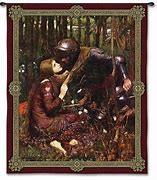
Whatever I do in life, I do in the belief that I have a poet’s soul, and I mentally embrace my Muse. I hold out my arms to my Muse but God forbid she ever walked toward them for I feel pretty sure that would put an end to the songs and stories and paintings and dances I still NEED (far more urgent than a mere want) to create in the few years I have left.
muse
Definition of muse (Entry 3 of 3)
1 capitalized : any of the nine sister goddesses in Greek mythology presiding over song and poetry and the arts and sciencesClio is the Greek Muse of history.
2: a source of inspiration especially : a guiding genius eg ´The writer’s beloved wife was his muse.
3: POET´
Beethoven told his wife he was leaving her, and she said, ÿou can´t leave me, I am you inspiration !´ To which Beethoven retorted, ´Inspiration? Ha Ha Ha HAAH !

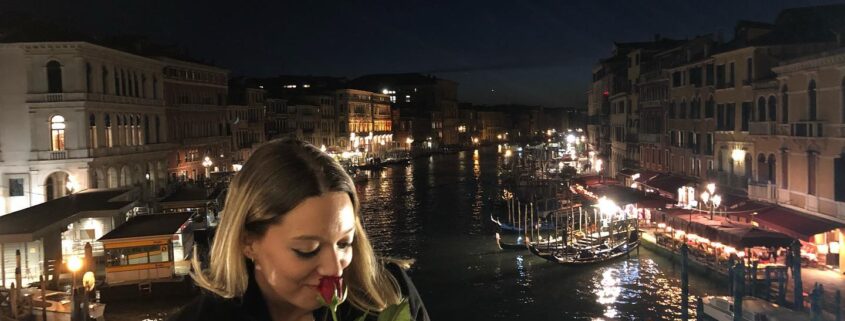


Leave a Reply
Want to join the discussion?Feel free to contribute!